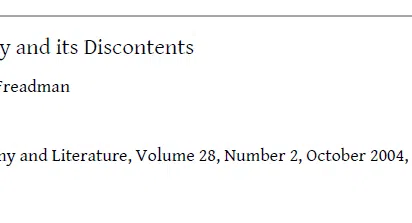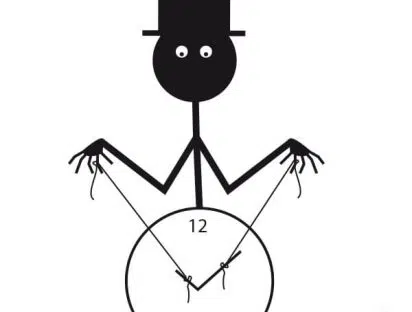It has been said that the way the war in Ukraine is being fought is “archaic.” The adjective – which here refers to a fact belonging to “a very old stage of a process” [1] – comes to mind in relation to ordinary situations, including professional ones. It is hidden behind expressions such as: “You’re still stuck in that rut,” i.e. at an earlier stage, in a bygone era, in an outdated way of thinking. But what does this archaism reveal? A specific attitude of mind? A blindness of reason? A “repetition of the same mistakes?” A relativistic or ethnocentric judgment? We explore these questions in several articles. The first focuses on “informal” descriptions of the concept of archaism.

Let us begin with the application of the concept of archaism to the war in Ukraine. Criminologist Alain Bauer has approved the expression “archaic war” to qualify, in his words, “a dirty war and a dirty war at the same time, [which] is really the worst that one can imagine” [2]. It is understandable that, in this usage, the word “archaic” means not only a return to the past – a return to the horror of wars where civilian populations are terrorised, tortured and killed – but also a loss of memory of past wars, notably the Second World War. The archaism here could be evidence of a voluntary retrograde amnesia, a motivated forgetting of an irrational nature [3].
A recent article published by the European Council on Foreign Relations (ECFR) gives content to the archaism of the war in Ukraine. According to its author, this war “imposes an agenda on Russia that is deeply archaic:”
On 24 February, everything changed. Putin’s war in Ukraine imposes an agenda on Russia that is deeply archaic. It is archaic even for the president himself – Putin, shaped by the Soviet experience, had always been more a proponent of a ‘Yalta system’, a world organised around great-power deals. But now he has launched an attack motivated by colonialism, history, and religion. He has engaged in a crusade-style war to essentially liberate the cradle of ‘Russian statehood,’ in the course of which he has jettisoned most of the international leverage Russia previously had. [4]
The archaism referred to here is based on reasons that refer to a background framework: an ideology (colonialism), an interpretation of the facts of the past (history) and a spiritual belief system (religion). This frame of reference is rooted in the past, but it is the colonialist doctrine that has the greatest “archaic value” because it has been refuted by the contemporary democratic ideal to which the Western world aspires.
But the ECFR article does not reserve the adjective “archaic” for war as such. It also applies it to Russia:
“Willingly or otherwise, the country is now stuck with an archaic domestic political system, an archaic economy, an archaic foreign policy agenda, and an archaic debate.”
This excerpt shows that the domain of archaism is particularly wide. Any political, economic, diplomatic and social situation can be called archaic if it refers to values and norms that have been rejected by the political, economic, diplomatic and social order of the present time.
If we leave the case of the war in Ukraine and consider the economic order, a large company indifferent to business ethics and corporate social responsibility – indifferent to recommendations on respect for human rights, environmental protection, anti-corruption, diversity, etc., which have been the subject of soft law and which emanate from international organisations such as the UN, the OECD or the International Labour Office – could today be judged archaic.
At the individual level, it would be considered archaic (among other things) if a manager told his or her team that maternity leave would be unwelcome for the coming year because of the workload; the position of a sales manager who would rather receive a box of luxury cigars from his supplier than allow his company to benefit from the end of year rebate it is due; or the position of a business network manager who refuses to tell members how her remuneration is calculated even though it is based on their membership fees [5]. Such violations of the norms of diversity and respect for others, integrity (in the sense of the fight against corruption) and transparency seem to belong to another age, an age contrary to the idea of progress and the spirit of modernity.
In the field of business ethics, the word “archaism” has been used mainly in relation to leadership [6]. The “archaic leadership styles” which, according to Stefan Gröschl and Patricia Gabaldon, “have remained dominant in numerous organisations,” are described and contrasted with “modern” and “sustainable” models [7].
Archaic models develop in a context marked by fear and its associated routines:
Archaic leadership models are predominantly based on power derived from routines that employees and subordinates return to in times of fear and uncertainty […]. When individuals fear the future, they tend to protect themselves through known and ready-made behaviors, patterns, processes, and practices with limited consideration of and courage to pursue new and different ways of doing things. [8]
In contrast, non-archaic leadership is based on “vision” and “sense-making,” together with, as the following excerpt indicates, “dynamic” thinking, “courage” and “moral consciousness:”
“Creating ways of doing business in a more responsible and sustainable way means that business leaders should be ‘morally conscious’ […] and ‘give voice to their values […] to develop a corporate culture or a societal environment where no one cops out, passes the buck or dreads the risk of action’ […]. This moral consciousness and critical self-inquiry together with courage and self-confidence, trust building, and synthetic, dynamic, and non-linear thinking form the competencies and attitudes crucial for future decision-makers when leading their firms in a responsible way through complexities and uncertainties.” [9]
Gregory Jin and his colleagues situate their discussion in the financial domain [10]. They seek to identify the mindset that may have led to the 2008 economic crisis. In this context, they describe two categories of companies in the financial sector, including a particular type of bureaucratic organisation:
The mechanistic-coercive bureaucratic organizations created concealed or closed arbitrary power-based decisional environments that inhibited optimal and free expressions or exchanges among the employees or the stakeholders and between the employees and managers/executives. [Chow (2010)] stated that ‘Wall Street firms by and large hew to a seemingly archaic, top-down command structure, laden with hierarchies’ and that ‘Wall Street corporations lacked an open trusting culture and the conformist mindset and groupthink prevailed in Wall Street’.
Finally, the term “archaic” is sometimes associated with patriarchy. This association is found in the empirical study of compassion proposed by Ace Volkmann Simpson and colleagues [11]. The following excerpt is a comment made by the reader of one of the two online articles that the authors had submitted to respondents and that were likely to activate the emotion of compassion (the article in question concerns a police officer receiving an emergency call from a woman, a situation that will turn out to be dramatic):
At the organizational level comments focused on poor organizational culture, and poor systems and procedures, as well as overstretched resources. With regard to organizational culture one comment stated, ‘This archaic patriarchal behavior is common […] and it’s about time women were treated with respect, especially when in dire straits and male officers stopped misusing their power.
Si nous quittons le cas de la guerre en Ukraine et considérons l’ordre économique, une grande entreprise indifférente à l’éthique des affaires et à la responsabilité sociale de l’entreprise – indifférente aux recommandations en matière de respect des droits humains, de protection de l’environnement, de lutte contre la corruption, de diversité, etc., qui ont fait l’objet de textes relevant du droit souple et qui émanent d’organisations internationales telles que l’ONU, l’OCDE ou le Bureau International du Travail – pourrait aujourd’hui être jugée archaïque.
These descriptions allow us to schematically depict an archaic way of thinking, understood in an extreme sense. It is characterised by a lack of openness and listening to others, and, more profoundly, of empathy towards others; an absolute priority given to control, particularly hierarchical control, showing a mistrust of others; an exclusive reference to the values and norms of a past that preceded the present movements in society, including patriarchal values where appropriate; an indifference to the values and norms that are promoted by progress or a resistance to any change that promotes those values and norms. Is this attitude of mind plausible? Does it reflect what is meant by a judgment of archaism? We will continue the discussion in the next article.
Références
[1] Dictionnaire historique de la langue française Le Robert, 4th edition, 2010.
[2] See the tweet from LCI on 20 May 2022. The exchange with journalist Jean-Michel Aphatie is as follows: “What is important is to save civilians. War is war, it’s dirty. Here it’s a dirty war, it’s really the worst that one can imagine. – It’s an archaic war… – Yes, absolutely.”
[3] Retrograde amnesia refers to “the inability to recover old memories” (P. Cappeliez, À la lumière de mon passé. Mes souvenirs autobiographiques pour me connaître et me comprendre, Mardaga, 2018).
[4] "Putin’s archaic war: Russia’s newly outlawed professional class – and how it could one day return", European Council on Foreign Relations / Conseil européen pour les relations internationales, 23 June 2022.
[5] All three situations are real, but only the second has been documented. Here is the relevant passage: “Last week we had to give a customer a 900 euro discount. A small thing. Well, the customer replied: ‘Forget about the discount! But I don’t mind a box of cigars’” (in V. Calvez (ed.), “Tout compte fait,” Le management en archipel, tome 2 : réussites, tensions et paradoxes dans les organisations, éditions ems – Management et Société, 2016).
[6] The word is used in the few articles dealing with giving and reciprocity according to French anthropologist Marcel Mauss.
[7] S. Gröschl & P. Gabaldon, “Business schools and the development of responsible leaders: A proposition of Edgar Morin’s transdisciplinarity,” Journal of Business Ethics, 153(1), 2018, pp. 185-195.
[8] Ibid.
[9] Ibid. The quotes are from N. Pless, « Understanding responsible leadership: Role identity and motivational drivers,” Journal of Business Ethics, 74, 2007, pp. 437-456, and H. Bettignies, Developing responsible leaders: Who is responsible? Brussels, The Globally Responsible Leadership Initiative Press, 2013.
[10] K. G. Jin, R. Drozdenko & S. DeLoughy, “The role of corporate value clusters in ethics, social responsibility, and performance: A study of financial professionals and implications for the financial meltdown,” Journal of Business Ethics, 112(1), 2013, pp. 15-24. The quote is from W. Chow, “Banks and governance: Will the U.S. financial reform act restore trust in wall street?” 2010.
[11] A. Volkmann Simpson, S. Clegg & T. Pitsis, “Normal compassion: A framework for compassionate decision making,” Journal of Business Ethics, 119, 2014, pp. 473-491.




